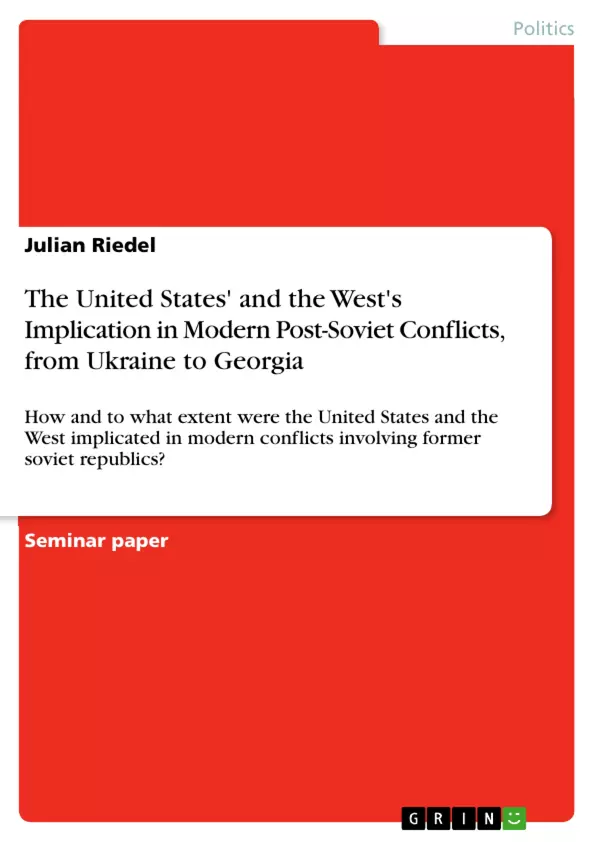This paper aims at measuring the relative impact the West and essentially the United States of America had on two escalations within the post-soviet space, disrupting Russia’s sphere of influence. It is focused on a comparative approach, distinguishing differences in how the U.S. weighed in on different developments. We will argue that while the West mingled in Ukraine’s internal affairs, contributing to the country’s political instability, its implication was very different from the one it had in the 2008 wars in the Caucasus, being Georgia and its territories of Abkhazia and South Ossetia.
Inhaltsverzeichnis (Table of Contents)
- I Introduction
- II Ukraine's Orange Revolution: an Early U.S. Impact in Ukraine's politics.
- III The United States, a counterbalance to Russian dominance in the Caucasus.
- IV Conclusion NATO Membership as outcome of the West's lasting implications ?
Zielsetzung und Themenschwerpunkte (Objectives and Key Themes)
This paper aims to measure the relative impact the West, particularly the United States of America, had on two escalations within the post-Soviet space, disrupting Russia's sphere of influence. It takes a comparative approach to analyze differences in how the U.S. intervened in these developments. The paper examines the influence of global forces such as the Russian Federation, the European Union, and the United States on Ukrainian and Georgian politics, analyzing the implications, interests, and possible influences of key stakeholders in relation to the crises.
- The West's impact on post-Soviet conflicts
- Comparative analysis of US involvement in Ukrainian and Georgian politics
- Russia's sphere of influence in the post-Soviet space
- The role of global forces in Ukrainian and Georgian politics
- The implications of the West's involvement in post-Soviet conflicts
Zusammenfassung der Kapitel (Chapter Summaries)
- Introduction: This chapter discusses the importance of Ukraine to Russia's foreign policy formulation and examines the similarities and differences between the conflicts in Ukraine and Georgia. It highlights the significant role of the United States in both conflicts and sets the stage for a comparative analysis of the West's involvement.
- Ukraine's Orange Revolution: an Early U.S. Impact in Ukraine's politics: This chapter analyzes the Orange Revolution, the first of three major disturbances in Ukrainian politics. It explores the factors contributing to the protests, including the Kuchmagate scandal and Viktor Yanukovych's performance as prime minister. The chapter examines the role of the United States in supporting the protests and influencing the outcome of the presidential elections. It also discusses the broader implications of the West's involvement in Ukraine's internal affairs.
- The United States, a counterbalance to Russian dominance in the Caucasus: This chapter explores the United States' role in the 2008 conflicts in Abkhazia and South Ossetia. It examines Russia's interests and motivations in the region and analyzes how the United States presented a counterbalance to Russian dominance.
Schlüsselwörter (Keywords)
The primary focus of this paper lies on the interplay of Western influence, particularly US involvement, in post-Soviet conflicts, specifically in Ukraine and Georgia, in relation to Russia's sphere of influence. Key themes encompass the Orange Revolution, the Euromaidan protests, Crimea's annexation, the 2008 wars in the Caucasus, the role of global forces, and the analysis of interests and motivations of stakeholders involved. The paper delves into the implications of these events for the political and economic stability of the regions and for the broader international order.
Frequently Asked Questions
What was the impact of the U.S. on Ukraine's Orange Revolution?
The U.S. supported the protests and democratic movements during the Orange Revolution, which acted as an early disruption of Russia's sphere of influence in Ukrainian politics.
How did the U.S. involve itself in the 2008 Caucasus conflict?
In Georgia, the United States acted as a counterbalance to Russian dominance, supporting Georgia's territorial integrity during the wars over Abkhazia and South Ossetia.
What are the main differences between U.S. involvement in Ukraine and Georgia?
While the West focused heavily on internal political stability and democratic reforms in Ukraine, its role in Georgia was more about counterbalancing direct Russian military and regional dominance.
Why is Ukraine so important to Russia's foreign policy?
Ukraine is considered central to Russia's sphere of influence due to historical, cultural, and strategic ties, making any Western leaning a major point of contention.
Is NATO membership a goal for these post-Soviet states?
The paper explores how NATO membership has been presented as a potential outcome of lasting Western implications, though it remains a highly sensitive issue for Russia.
- Quote paper
- Julian Riedel (Author), 2017, The United States' and the West's Implication in Modern Post-Soviet Conflicts, from Ukraine to Georgia, Munich, GRIN Verlag, https://www.grin.com/document/385473



